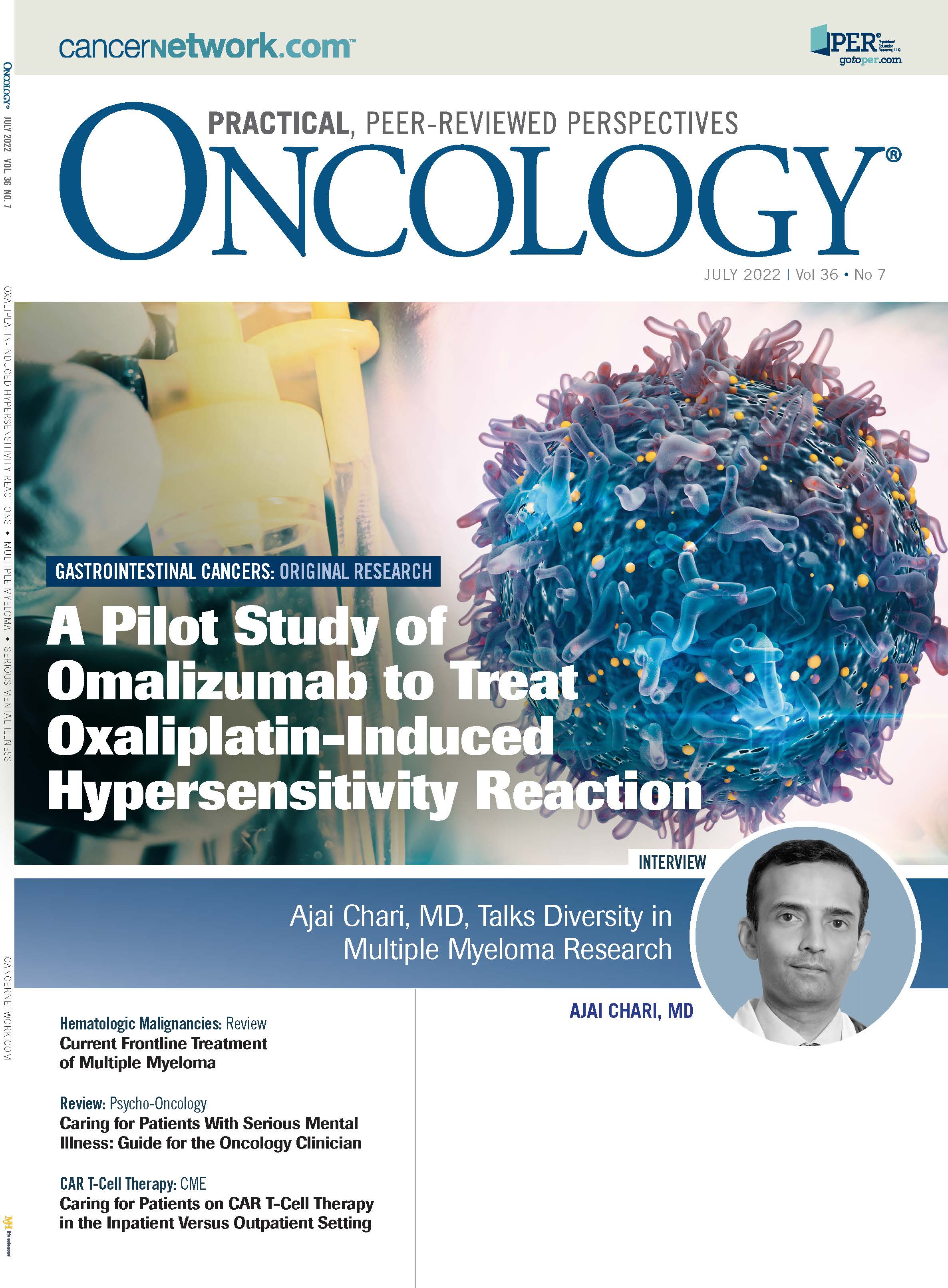Platinum Hypersensitivity Reaction (HSR): An Ongoing Problem in Cancer Treatment
In this month's Letter to the Readers, ONCOLOGY co-editor-in-chief Howard S. Hochster, MD, discusses oxaliplatin hypersensitivity reaction in gastrointestinal cancer.
In this issue of ONCOLOGY®, Stacey Stein, MD, and colleagues report on the use of anti–immunoglobulin E (IgE) antibodies (omalizumab; Xolair) for the successful treatment of oxaliplatin hypersensitivity reaction (HSR; see pages 414-419). In the spirit of full disclosure, I am the senior author on this paper and originated the idea of using omalizumab for platinum HSR about 10 years ago. This is based on the known biology of platinum hypersensitivity, which is mediated by IgE.
Repeated exposure to platinum results in HSR in a fairly high proportion of those exposed. This is well known from platinum battery workers who after
1 to 2 years of continued exposure begin to develop significant allergies. The issue of platinum HSR in the treatment of cancer has been present since
cisplatinum was first introduced. It is well documented that platinum HSRs result from prolonged intermittent exposure to these drugs, or after a break, and at the time of retreatment. Gynecologic oncologists have been dealing with this when retreating ovarian cancer, mainly using carboplatin; they have developed a number of means of managing adverse reactions, including subcutaneous drug testing, prolonged and gradual dosing increments to help bind the platinum slowly before triggering HSR, and even admissions to intensive care units for treating such patients with “desensitization.”
The problem of oxaliplatin HSR has also been around since the agent’s introduction in the 1990s. It is documented that up to 40% of patients treated with oxaliplatin for advanced disease are taken off treatment without progression, and 20% of patients in the adjuvant setting do not complete 6 months of treatment.1 These patients typically stop the drug due to cumulative neurotoxicity or other events, mainly related to myelosuppression. Retreatment with FOLFOX after progression on other drugs, can lead to responses once more, as we have seen in other scenarios. However, we frequently find that the first dose of FOLFOX retreatment is tolerated well, but the second or third treatment results in an amnestic response of the immune system to the platinum and causes a significant HSR.
Omalizumab is an anti-IgE antibody approved for treatment of asthma and urticaria.2 It has documented use for allergic reactions to peanuts and has also been used for drug reactions, particularly in chemotherapy. It can block IgE activation of mast cells, prevent HSRs, and reverse ongoing HSR by releasing IgE binding. As noted in the review article by Bumbacea et al,2 current experience is limited to only 1 or 2 prospective trials for chemotherapy HSR, including the Stein article published here, which is the largest experience to date. Other publications are case reports. Pharmaceutical sponsors have shown little interest in supporting large trials, but the problem of oxaliplatin HSR is significant: If patients were not discontinued from oxaliplatin retreatment for HSR, they might continue to benefit from treatment. In our study of 9 patients treated prospectively with biweekly omalizumab, 8 of 9 patients reached the primary end point of receiving 2 cycles of treatment and reaching the next scan, and 5 of 9 were able to achieve disease control for a median of 6 months. This new and more biologic approach to HSR has promise and should be further tested in multicenter trials.
REFERENCES
- Alberts SR, Sargent DJ, Nair S, et al. Effect of oxaliplatin, fluorouracil, and leucovorin with or without cetuximab on survival among patients with resected stage III colon cancer: a randomized trial. JAMA. 2012;307(13):1383-1393. doi:10.1001/jama.2012.385
- Bumbacea RS, Ali S, Corcea SL, et al. Omalizumab for successful chemotherapy desensitisation: what we know so far. Clin Transl Allergy. 2021;11(10):e12086. doi:10.1002/clt2.12086
